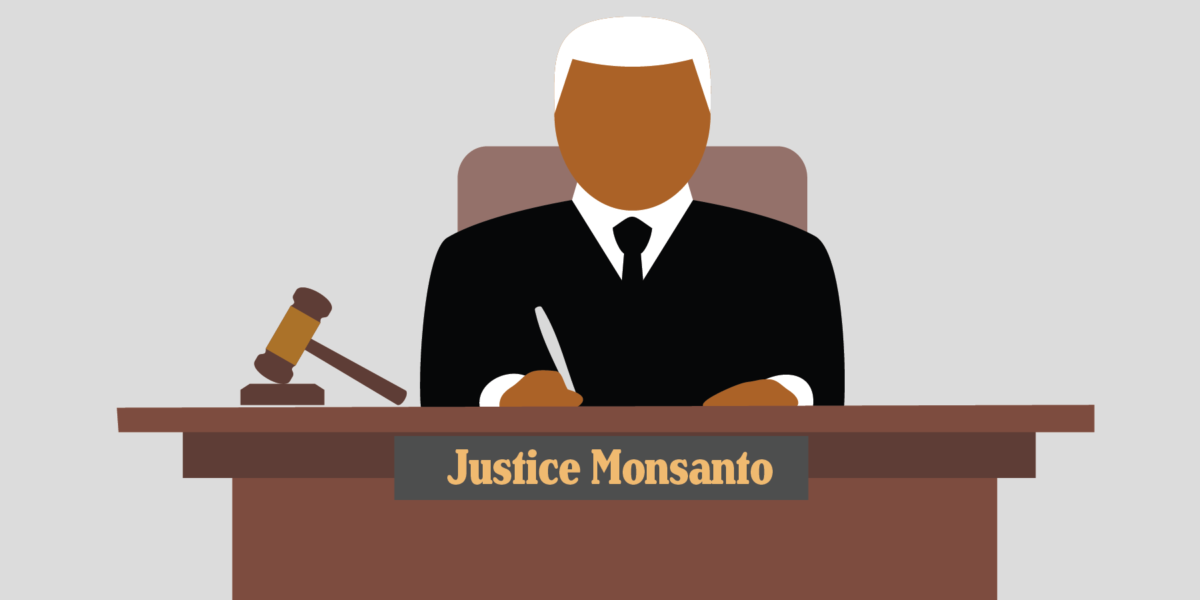Monsanto Alum Clarence Thomas

In college, there were several different dining options, and where one ate could tell a lot about a person. The very large athletes went to an all-you-can-eat buffet called Full Fare. That seemed like a perfect opportunity to scope out the guys, until five too many jumbo bowls of Captain Crunch bought me a round trip ticket down to the much coveted Ladies Fashion Barn of West Lebanon, New Hampshire to buy new pants.
On the opposite end of the dining spectrum was an organic cafeteria, where diners popped in after long hikes, midday kayaking, or stints working on the new organic farm. Despite their shining, clear skin that lacked the enviable ruddiness of my allergic eczema, dining on quinoa and greens didn’t hold a candle to the joys of the fro-yo machine + oreos over in the Food Court with my friends Jen, Jenn and Jennifer.
Changing one’s diet, without a serious health scare to keep one in line, is even harder. Now that my body has let me know that it demands clean food if I hope to avoid neuropathy, headaches, tummy-troubles and stints in and out of sadness, I’ve been forced to ditch team Food Court for team Organic. Further escalating my commitment, my office decor prominently features stacks of research papers that prove the slow destruction of our various bodily systems when exposed to glyphosate and other pesticides.
So now that I’m all in, I decided to start growing my own vegetables this spring. The lot on which my house resides isn’t huge, and my front yard facing a busy street is my only option for agricultural endeavors. A few cranky neighbors are quick to criticize anything out of the norm in terms of landscaping, and in fact have been known to report infringements (like when I kept my compost bin partially visible at the top of my driveway) to the city.
With this potential neighborly cantankerousness in mind, I ripped out the grass and put in six well camouflaged redwood boxes. I also added a “Pesticide Free Garden” sign, mortifying my daughter for its inherent Karen-ness of knowing best about what others should do. This week, many other activist signs popped up in my Bay Area, California neighborhood, but more on the theme of highly politicized US Supreme Court rulings.
I consider the pesticide debate to be non-partisan, because both sides of the aisle are bought into agricultural chemicals. But I do have a specific bone to pick with Justice Clarence Thomas, AKA Justice Monsanto himself.
Not many people realize that Thomas began his career as a corporate attorney at Monsanto. Originally registered as a Democrat, Thomas reportedly became more conservatively minded over time. His time at Monsanto, and later in government service, influenced his position in supporting corporate deregulation and anti-environmental policy.
In a recent article in the Harvard Law Review, Yale Law graduate Scott Stern (who now works as a clerk in the Ninth Circuit of Appeals) delves into the influence Thomas has had on environmental policy and chemical company liability over the decades of his tenure. He concludes:
The effect Monsanto and the broader chemical industry had on him was profound. The effect he, in turn, has had on the environment and on our environmental rights is undeniable.
Scott Stern, Harvard Law Review
Read the article in its entirety HERE.
As we awaited the response from SCOTUS as to whether or not they would hear the Monsanto v Hardeman and Monsanto v Pilliod appeals, I wondered how Thomas and his conservative team would possibly deny hearing the case. In Solicitor General Elizabeth Prelogar’s amicus curiae brief, representing the “United States”, she argued that SCOTUS should not hear the Roundup cases because FIFRA, the Federal Insecticide Fungicide and Rodenticide Act, does not prevent California from placing a warning label on Roundup nor does the EPA approval of glyphosate absolve Monsanto of liability for failure to warn.
The US Supreme Court is asked to review thousands of cases, but only hears around 70 cases per term. Could it be that the question of whether EPA assessments on health risk of chemicals – whether inaccurate, accurate or bought by industry – becoming the law of the land was unsavory even for Thomas?
Or perhaps there was just too much controversy already on the SCOTUS calendar.
